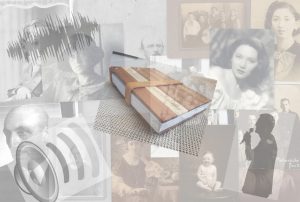
I have been having discussions for the last few months with my friend Alan Martin about recording one’s family history as an alternative or adjunct to writing it. I have been writing my ancestor’s family history through blog posts on my two family history websites for years. I fully intend to write a book about one branch of my tree, hopefully soon.
In any case, I was intrigued by his idea and asked him to write this article below about using audio in documenting one’s family history. Obviously it won’t work too well for our dearly departed relatives and ancestors unless we record that, but I digress.
I need to let you know that I never promote products. I have invited just a few product/service providers to write posts over the years. Also as a full disclosure I have no financial or other interest in Alan’s product Audiobiography. My only goal is to educate.
The Case for Adding Audio to Your Family History Collection
Have you ever kept a voicemail after someone had passed? Or refused to remove their phone number from your contacts? Hearing their voice makes it seem as if they are right there with you, even when they’re gone. Even the idea of hearing their voice is hard to let go. The human voice is the most intimate form of communication. It’s timeless, and cannot be faked or reproduced. Without question, hearing a story from my father in his own voice will forever mean more than hearing a story about my father after he’s gone. Audio can become the most personal and authentic part of a family history collection, and here are three reasons why it should.
1. Audio keeps a uniquely personal connection alive for generations
Our voice is the purest window into our mind and personality. It’s how we speak, formulate, pause, backtrack, storytell, laugh, sometimes cry, and sound that reveals the most about who we are. Our voice is a direct reflection of our mind and personality at work, in flashes of time that soon pass, never to return.
I came to a powerful realization as my wife and I watched videos of our family. I didn’t care how they looked, where they were, or what they were doing. Those things faded into the background, and I found myself fixated on their voice because that’s what felt like them. The real them. I became convinced that the truest picture of a person emerges through audio, and I began capturing my family’s voice, in audio. I knew that in 40 years, my kids would cherish hearing the most authentic version of themselves. And I believed that when I was gone, they would also find meaning in hearing some of my experiences and beliefs, in my own voice.
2. Audio is easier and more accessible at any age than writing or video
Writing is hard. Most of us aren’t great at it to begin with, and it becomes more difficult with age. Owing to grammatical weaknesses and physical effort, writing often starves of nuance, and captures only a fraction of what would otherwise be captured if the barrier were entirely lifted.
Videos have been made easier thanks to mobile devices, but they create an “on-stage” moment that is mildly uncomfortable at best, and impossible to overcome at worst. The camera’s watchful eye makes us less likely to engage completely or authentically.
Then there’s audio. It quietly captures the most authentic version of ourselves with a single touch of a button and nothing more. It doesn’t care what we wear or how we look. It has the magical ability to disappear in the background while the conversation continues. Neither pen nor camera can claim this powerful and natural ability.
3. Audio is a lightweight and preservable technology
Since we capture history to pass it down from one generation to the next, thinking long term about the format of the content we collect is critical. Audio can be fifty times smaller than video, making it less expensive to store, transport, playback, and back up, forever. When you consider this benefit, which doesn’t require a trade-off in outcomes or quality, audio scores high and deserves to be a leading component of our personal and family records.
Tools are available to capture family history in audio if we make it a point to use them. Smartphones put an audio recorder in nearly everyone’s hands. We’ve created a tool called Audiobiography which makes recording and sharing life history in audio even easier. But wherever you begin, just begin. Once a voice is gone, it can’t be replaced. Capturing it now will allow a purer form of history and remembrance to live on for generations.
Alan Martin is one of the creators of Audiobiography, an audio-enabled physical workbook that is available at https://audiobiography.com